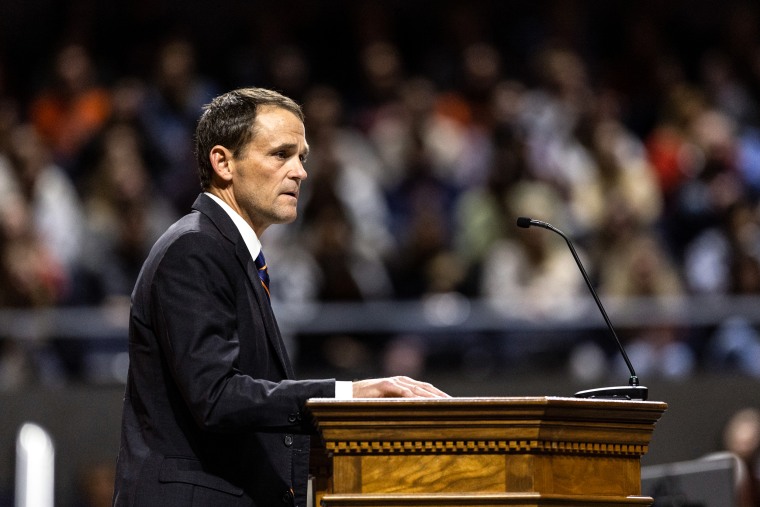The president of the University of Virginia is resigning following pressure from the Trump administration to step aside amid a Justice Department investigation into the school’s diversity practices.
James E. Ryan convened a meeting with his senior leadership Friday and announced that he would be stepping down, according to a source who attended the UVA Board of Visitors meeting.
The Justice Department had demanded Ryan step down to resolve an investigation over the school’s diversity, equity and inclusion initiatives, according to The New York Times, which was first to report the news of his resignation.
In a letter to the university community on Friday, Ryan said, "I am writing, with a very heavy heart, to let you know that I have submitted my resignation as President of the University of Virginia."
"To make a long story short, I am inclined to fight for what I believe in, and I believe deeply in this University," Ryan wrote. "But I cannot make a unilateral decision to fight the federal government in order to save my own job. To do so would not only be quixotic but appear selfish and self-centered to the hundreds of employees who would lose their jobs, the researchers who would lose their funding, and the hundreds of students who could lose financial aid or have their visas withheld."
The university’s governing Board of Visitors voted in March to end its DEI office under the Trump administration’s order that U.S. schools end diversity programs or risk losing federal funding. Republican Gov. Glenn Youngkin had praised the decision, saying the board “voted for common sense.”

“DEI is done at the University of Virginia. We stand for the universal truth that everyone is created equal, and opportunity is at the heart of Virginians’ and Americans’ future,” he said in a March 7 news release.
But the Justice Department accused the school of failing to dismantle DEI and sent a letter dated June 17 warning that it needed to act fast, the NYT reported.
The DOJ and the University of Virginia did not immediately respond to requests for comment on Friday.
Speaking at a meeting of the university's governing board in early June, Robert D. Hardie, a member whose term expires Monday, praised Ryan's leadership and noted the institution's excellence in academic rankings and sports and in producing Rhodes Scholars since he started as president in 2018.
“I list all these metrics to highlight the remarkable job that Jim Ryan is doing, and the data that shows how well he has done as our President,” Hardie said, according to a transcript of his remarks. “We can all agree or disagree about many things, but the numbers are impressive."
The state's two senators, Mark Warner and Tim Kaine, both Democrats, said in a joint statement Friday that it was “outrageous that officials in the Trump Department of Justice demanded the Commonwealth’s globally recognized university remove President Ryan.”
They called him a “strong leader” who served the school “honorably and moved the university forward.”
“Virginia’s economy and prosperity depend on the strength and integrity of our higher education system,” the senators said. “Decisions about UVA’s leadership belong solely to its Board of Visitors, in keeping with Virginia’s well-established and respected system of higher education governance. This is a mistake that hurts Virginia’s future.”
Peter McDonough, vice president and general counsel of the American Council on Education, a higher education trade association, said the reported pressure on Ryan reflects the Trump administration's broad sense of power even as federal law might not always back it up.
“Congress has passed no statute that purports to allow the executive branch to micromanage aspects of a university — I think we could actually say the opposite," McDonough said, citing federal law that prohibits federal "direction, supervision, or control” of any educational institution.
Ryan's resignation may signal a historic disruption for higher education, which he describes as a "mosaic of different types of higher ed institutions, public and private, large and small, that actually drew their collective strength from being independent and different," McDonough said.
Now they may need to align with the winner of the last presidential election, he said, adding, "That's a worry."
Armand Alacbay, senior vice president of strategy at the American Council of Trustees and Alumni, a nonprofit group focused on higher education governance, said an institution's leadership is the domain of its governing board. The resignation is a product, he said, of unprecedented "governmental intrusion."
“I think there's grave danger to the quality and future of higher education if these type of decisions become a function of the federal government," Alacbay said.
The school’s board accepted Ryan’s resignation, The New York Times reported. He was the ninth president to lead the university since the position was first filled in 1905.

